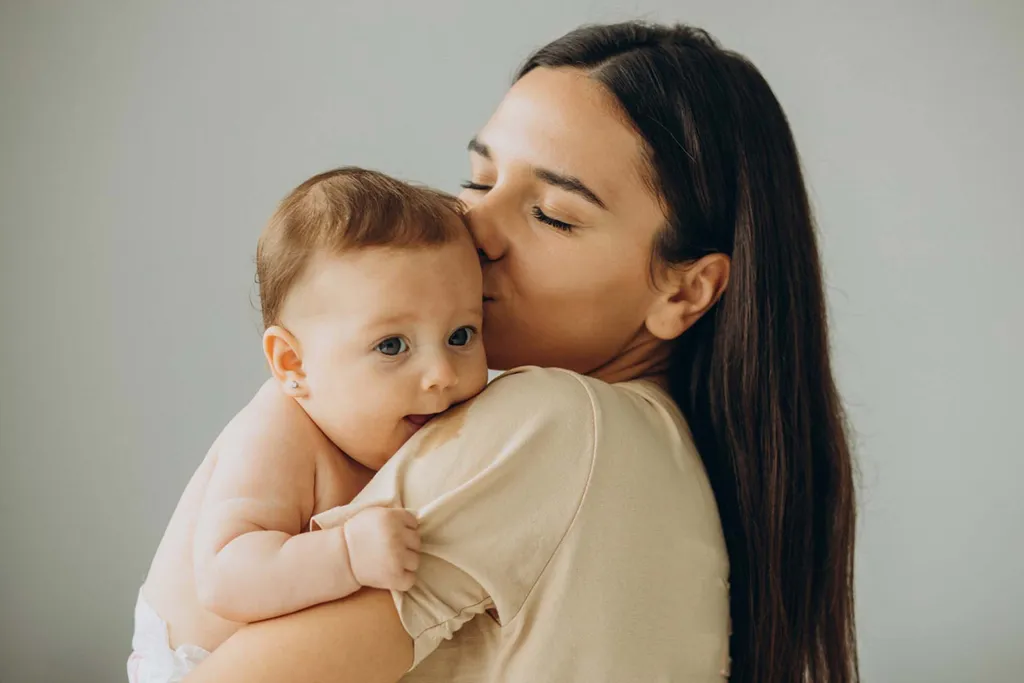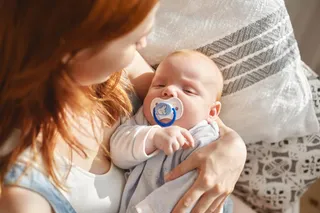How to Stop Baby Hiccups After Feeding
Baby hiccups are normal, and simple home remedies like upright positioning, gentle back pats, or a pacifier can help ease them.

Hiccups are one of those things babies do that can leave parents wondering, “Is this normal?” It’s completely understandable to feel a little worried when your baby hiccups, especially if you’re new to parenthood.
The good news is that hiccups are a normal part of life for babies and usually nothing to worry about. They often show up after feeding because your baby’s tiny diaphragm — the muscle that controls breathing — is still learning how to work smoothly.
The even better news? You can try simple, safe techniques right away to help calm them.
Why Do Babies Get Hiccups After Feeding?
Hiccups result from a spasm of the diaphragm, the tiny muscle under the lungs that regulates breathing. This is common in newborns as their diaphragm and digestive system are still maturing.
Common triggers include swallowing air while feeding, overfeeding, eating too quickly, or feeling excited or overstimulated. Most of the time, hiccups are completely normal and harmless. Your baby may seem a little fussy or squirmy, but the hiccups themselves aren’t painful.
In fact, research shows that pre-term babies hiccup even more often than full-term infants, spending about 1% of their day — or roughly 15 minutes — hiccupping as part of their early development (1).
When it comes to distinguishing normal from concerning hiccups, short, frequent hiccups that happen after feedings and stop on their own are typically nothing to worry about.
Parents should be more cautious, however, if hiccups last for hours or are accompanied by symptoms like vomiting, feeding difficulties, irritability, poor weight gain, or breathing problems, in which case it’s best to reach out to a pediatrician.
How to Stop Baby Hiccups After Feeding
Hiccups may be harmless, but it’s natural for parents to want to help their baby feel more comfortable. There’s no guaranteed way to make hiccups stop instantly, but there are a few techniques that can ease them.
Hold your baby upright after feeding
Keeping your baby in an upright position gives their tummy time to settle and helps prevent extra air from getting trapped. Try holding them against your chest or shoulder for 20–30 minutes after feeding. Not only does this support digestion, but it also creates a cozy bonding moment for both of you.
Burp your baby
Even if your baby seems content, trapped air can cause hiccups or gas. Burping helps release that trapped air before it causes discomfort. You can burp your baby midway through a feeding and again at the end.
For example, if your little one is bottle-fed, pausing halfway through to burp them may help reduce hiccups later.
Related: 5 Positions to Help Relieve Gas in Babies
Pat/Massage your baby’s back
Gentle pats or a soft circular massage on your baby’s back can help relax their diaphragm and ease hiccups by encouraging steady breathing. You can do this while holding your baby upright against your chest or sitting them on your lap with support.
Slow, rhythmic movements not only help release trapped air but also provide a calming, comforting touch that reassures your little one.
Apply gentle pressure to the diaphragm
Placing your baby tummy-down across your lap and resting your hand lightly on their back provides mild, even pressure that can help relax the diaphragm and ease hiccups. Always make sure your baby’s head is turned to the side and that they are fully supported to keep the position safe and comfortable.
Offer a pacifier
Pacifiers help ease hiccups because the sucking motion encourages your baby to breathe in a steady, rhythmic pattern. This gentle, repetitive action helps the diaphragm relax. When choosing a pacifier, look for one that is age-appropriate, soft, and shaped to support healthy oral development.
Related: Can Babies Sleep with a Pacifier? Here’s What Experts Say
How to Prevent Baby Hiccups
While there’s no single way to completely prevent hiccups, a few simple strategies can help reduce how often they happen and make feedings more comfortable for your baby.
Proper feeding position
Holding your baby in a slightly upright position during feeds can help milk flow smoothly and reduce the amount of air they swallow. This applies whether you’re breastfeeding or bottle-feeding — keeping your baby’s head slightly higher than their tummy supports easier swallowing and digestion.
Small, frequent feedings
Give your baby smaller amounts of milk more often to be gentler on their developing digestive system. For newborns (0-4 weeks), this often means feeding every 2–3 hours with portions that match their tiny stomach capacity, usually around 1–3 ounces (30–90 ml) per feeding.
Overfilling the stomach can irritate the diaphragm and trigger hiccups, so sticking to manageable volumes and consistent timing can help reduce how often hiccups occur.
Slow down the feeding pace
Feeding too quickly can cause your baby to swallow air, which may trigger hiccups. To help, take pauses during the feed to burp your baby, or use a slow-flow nipple if you’re bottle-feeding. When breastfeeding, make sure your baby has a good latch and allow natural pauses for swallowing and breathing.
What Not to Do for Baby Hiccups
While hiccups are usually harmless, certain actions can make them worse or cause unnecessary discomfort for your baby.
One thing to avoid is overfeeding. Giving your baby more milk than their small stomach can handle may irritate the diaphragm and increase hiccups. For example, if your baby is already showing signs of fullness — turning their head away or slowing their sucking — forcing them to finish the bottle or breast can make hiccups more frequent and uncomfortable.
Another common mistake is putting your baby down immediately after a feed. Laying them flat too soon can trap air in the stomach, which may trigger hiccups. Instead, keeping your baby upright for a short period helps digestion and gives the diaphragm a chance to settle.
It’s also best not to try to startle or scare your baby to stop hiccups. Some people think a sudden noise or gentle shake might work, but this can be stressful and unsafe. Comforting techniques — like holding them upright, burping, or offering a pacifier — are far more effective.
Finally, avoid rushing through feeds or ignoring your baby’s cues. Paying attention to signs of contentment or distress and adjusting the pace can prevent unnecessary fussiness.
When to Worry About Baby Hiccups?
Most of the time, hiccups are harmless and don’t require medical attention. However, there are times when it’s wise to reach out to your pediatrician. Seek guidance if your baby looks distressed or if hiccups persist for many hours.
In some babies, frequent or prolonged hiccups may be a sign of gastroesophageal reflux (GERD). Babies with GERD often show other symptoms along with hiccups, such as persistent coughing, spitting up, irritability during feeds, or trouble gaining weight.
If you notice these signs together with repeated hiccups, speak with your doctor. They can help determine whether there’s an underlying problem.
Takeaways
Baby hiccups may seem concerning at first, but they’re generally harmless. Safe strategies — such as holding your baby upright, burping, or offering a pacifier — can soothe them, and tuning into your baby’s signals helps you know what works best.
FAQs
Do baby hiccups hurt?
No. Most hiccups are not painful for babies. They may seem a little fussy or squirmy, but the diaphragm spasm itself doesn’t cause pain.
Do hiccups mean the baby is full?
Not necessarily. Hiccups are usually related to the diaphragm or swallowed air rather than how much your baby has eaten. However, if your baby shows signs of fullness — like turning away from the breast or bottle — it’s a good idea to pause the feeding.
Should I stop feeding if my baby gets hiccups?
Not always. Many babies continue feeding comfortably even with hiccups. If hiccups seem to make feeding difficult or your baby becomes fussy, slowing the pace, burping, or taking a short break can help. Trust your baby’s cues to decide whether to continue or pause.



